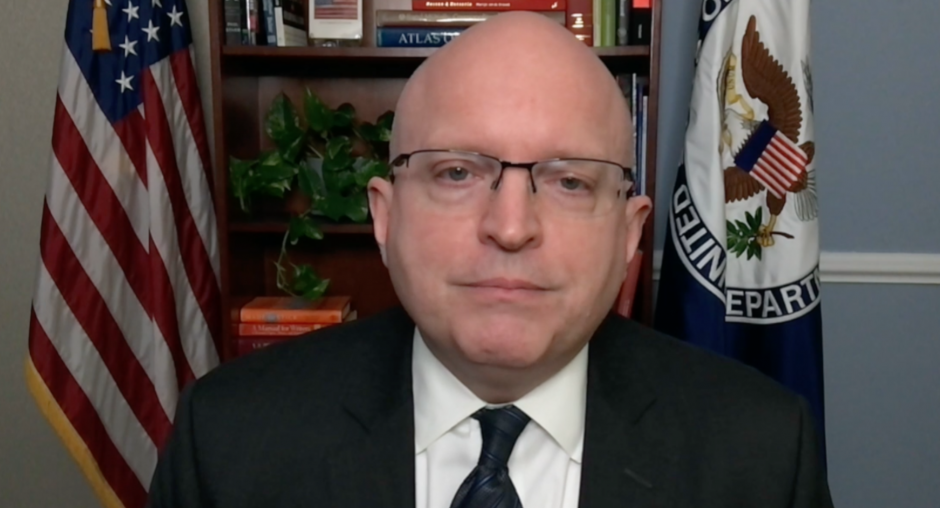OSCE Forum for Security Co-operation under United States’ Chairpersonship will focus on fulfilment of commitments, rebuilding military transparency and confidence

VIENNA, 20 January 2021 — Fulfilling commitments and rebuilding confidence and transparency are key steps to addressing new and long-standing politico-military issues in the OSCE region, said United States Acting Assistant Secretary of State for European and Eurasian Affairs Bureau Ambassador Philip T. Reeker in his video message to open the United States Chairpersonship of the OSCE Forum for Security Co-operation (FSC) today.
Addressing representatives of the OSCE participating States, Reeker recalled the US FSC Chairpersonship 18 years ago and said that many of the top issues from then remain salient today — counterterrorism, small arms and light weapons, including man-portable air defense systems (MANPADS), and emergency preparedness — but much has changed.
He underscored that the US FSC Chair “must confront new threats and security challenges that have come to the fore, in addition to longstanding issues and the dangers posed by stove piping our efforts to combat these threats.”
“[The] erosion of Europe’s security environment, in particular since 2014, is the biggest challenge we face today in this Forum,” Reeker said.
A first step to addressing that deterioration is “rebuilding military transparency and confidence,” he said, stressing that “more broadly, participating States of the OSCE need to hold each other to account for the fulfillment of the commitments they have made. There is no trust if commitments made by nations have no meaning.”
Elaborating on the US FSC Chair’s work programme, Reeker said it aims “to be well balanced, engages our partners in central Asia and addresses security concerns across the OSCE region.”
One of the US FSC Chair’s priorities is the Vienna Document, Reeker said. He noted that “updating the Vienna Document has been the Forum’s primary contribution over the years to confidence-building and military transparency.” He highlighted the call by the vast majority of participating States at the 2020 OSCE Ministerial Council to modernize the Vienna Document to strengthen military transparency and confidence and said the US FSC Chair will continue efforts to address its modernization.
He said that the US FSC Chair will hold its first security dialogue on NATO’s Enhanced Forward Presence. The second security dialogue will be the eighth OSCE High-level Military Doctrine Seminar, which the US FSC Chair will host. The Seminar will focus on constructive and goal-oriented dialogue on conventional deterrence and the competition doctrine, as well as co-operative security measures and crisis response in the context of the COVID-19 pandemic.
‘Confidence-building amid strategic ambiguity’ will be the topic of a third security dialogue to invite discussion on a range of new security challenges and gray zone competition, Reeker said. He emphasized that these are “real, current day threats impacting all participating States in this Forum. We cannot afford to ignore this situation in this Forum. We must address it.”
Building on the efforts of the outgoing German FSC Chair, the US FSC Chair will also continue to focus on small arms and light weapons, including man-portable air defense systems (MANPADS), and explosive hazards in Central Asia, a key region of the OSCE. Two security dialogues will be devoted these topics, he added.
“While the world continues to shift in dramatic ways, the overriding goal of this Forum remains to enhance our common security,” Reeker said, while underscoring that this “goal is unachievable without the full, equal, and meaningful participation of women in the FSC and the OSCE at large.”
The US FSC Chairpersonship will convene, with the Swedish OSCE Chairperson-in-Office, a joint FSC-Permanent Council session on implementation of United Nations Security Council Resolution 1325 on Women, Peace and Security on the occasion of International Women’s Day in March. The joint session will focus on concrete proposals for incorporating the resolution into the work of the FSC.
The Chairpersonship of the Forum for Security Co-operation rotates three times a year. It takes the lead in setting the agenda for each meeting of the Forum and brings attention to issues concerning the implementation of commitments adopted by the Forum.